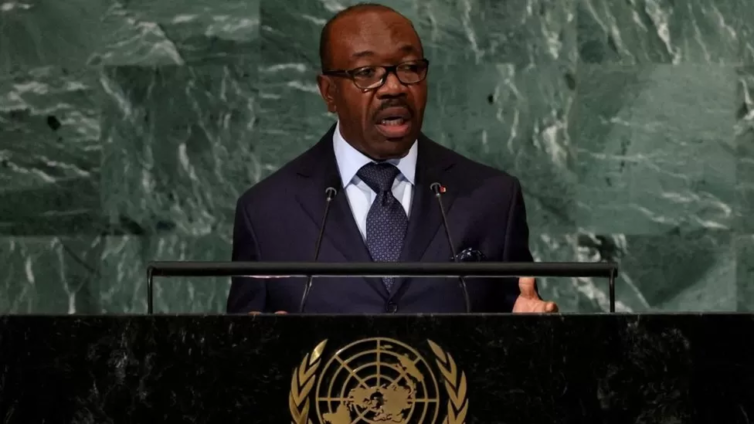Gabon has been partially suspended from the Commonwealth after military commanders carried out a coup ousting President Ali Bongo.
The decision was made by Commonwealth foreign ministers meeting on the margins of the United Nations general assembly.
Leaders called on Gabon to uphold the values and principles of the Commonwealth.
They asked the country to hold credible elections as soon as possible.
Gabon's military ousted Mr Bongo from power shortly after he was declared winner of the 2023 presidential election.
Mr Bongo had been in power in the oil-rich country since 2009, when he succeeded his father who had ruled the country for 41 years.
He was initially placed under house arrest as military leaders took over, but was later freed and given permission to travel abroad for medical check-ups.
The foreign ministers - sitting as the Commonwealth ministerial action group - have requested Gabon guarantee Mr Bongo's safety and that of his family, and said in a statement that they "strongly condemned the unconstitutional removal of the elected government from office".
They said Gabon's suspension was in place "pending the restoration of democracy". It excludes Gabon from all Commonwealth intergovernmental meetings and events, including ministerial and heads of government meetings.
The new prime minister, Raymond Ndong Sima, was installed as interim prime minister in September, after Gen Brice Oligui Nguema, who led the coup against Mr Bongo, became Gabon's transitional president.
Speaking to the BBC, Mr Sima said the country should hold fresh elections within two years.
Commonwealth ministers gave the new leaders of Gabon two years from 30 August 2023 to hold credible elections. They added in the statement that if progress was not made in that time, the country may be removed from the group altogether.
Despite condemnation of the coup from other international leaders in both Africa and the West, civilians appear to have welcomed the change.
Many Gabonese were sceptical about Mr Bongo's decision to stand for a third term. He first came to power in elections 14 years ago following the death of his father, Omar Bongo, who had monopolised the presidency for more than 40 years.
Some also held serious doubts about his capacity to provide effective leadership, after he suffered a stroke in October 2018.
Latest Stories
-
‘Doctors say you’re 20 years younger, but go easy’ – Mahama to Opoku-Agyemang
19 seconds -
Denmark to raise retirement age to highest in Europe
4 minutes -
Agape Arts Production rolls out Ghana’s maiden mobile theatre with Kelewele Junction
8 minutes -
Dr Seidu Jasaw delivers keynote at launch of Ghana Chapter of COFAAA
12 minutes -
Presidential jet unfit for use; undergoing 3-month ‘therapy’ – Omane Boamah confirms
14 minutes -
Akufo-Addo’s gov’t rundown presidential jet; its fuel tank is even corroded – Omane Boamah
19 minutes -
Sum 41 music agent among those killed in San Diego plane crash
28 minutes -
US House passes Trump’s ‘big, beautiful’ tax and spending bill
54 minutes -
Nigeria’s ruling party endorses President Tinubu for 2027 re-election
1 hour -
‘We need a law to stop abuse of mineral royalties’ – Chamber of Mines boss
1 hour -
‘Mineral royalties stay in Accra while mining communities rot’ – Chamber of Mines boss
2 hours -
‘But for mining, Ghana wouldn’t be here today’ – Chamber of Mines CEO laments neglect
2 hours -
It’s not mining company’s job to build skyscrapers’ – Chamber boss on community development
3 hours -
Tumu Community Cup: Soccer Babies to face Nabulo in opener as 24 Hours draw Tarsor
3 hours -
US Congress moves to block California ban on petrol-only cars
4 hours

